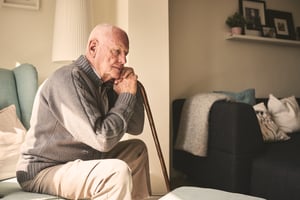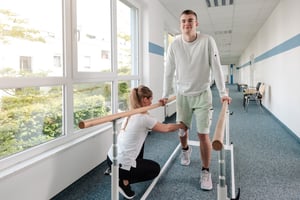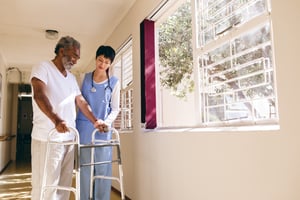.png)
Reducing the burden of social isolation and building connection through voice in healthcare
I’ve been thinking more and more about the power of voice in the last year. Two experiences specifically shaped my decision to join the team at Orbita:
- becoming a mother
- being hospitalized and on the other side of the patient-clinician interaction for the first time
As a nurse from a family of clinicians, healthcare was a calling of mine from an early age. In the last decade, I’ve become passionate about patient and clinician-centered design and empowering health and care through the use of technology.

Until recently, I had never been on the receiving side of care in the hospital. In an unexpected turn, my son was born via a Cesarean section. While I was overwhelmed with joy upon his arrival, my plan for a short hospitalization and quick recovery changed on a dime. I wasn’t able to get out of bed without assistance, was exhausted from many days of labor, and had significant surgical pain. On top of that, I was attempting to care for my newborn baby and learning the ropes of being a first-time parent.
Ironically, despite my healthcare and informatics background, my lifeline to the care team was through a call bell, often physically inaccessible given my limited mobility. This left me waiting without confirmation of a response for someone to help me reposition my newborn who was spitting up and out-of-reach in the middle of the night. It left me anxiously counting down to my next vital sign check as I waited for help to get to the bathroom, after my call bell had fallen to the floor.
Aside from the obvious need for hands-free voice-powered experiences while juggling the demands of being a new parent, I also thought about voice and how it connects us with others. I found our son’s recognition of my husband’s and my voice fascinating. Research indicates near term fetuses can recognize and show preference for their mother’s voice.¹
A particularly powerful example is a study of pre-term infants that revealed playing a recording of the mother’s voice while babies sucked on a pacifier improved development of feeding skills and shortened their hospital stay. The study also demonstrated that a mother’s voice can soothe a child in stressful situations, evidenced by a reduction in cortisol levels, the stress hormone, and increase in oxytocin, the social bonding hormone.²
 Lack of connection associated with isolation is an important risk factor for morbidity and mortality. Studies show that socially-isolated people rate everyday events as more intensely stressful.³ A meta-analysis found that lacking social connection carries healthcare risks comparable to smoking up to 15 cigarettes per day and increases a person’s risk of dying by 26 percent.4 At a system level, a 2017 study found that a lack of social contacts among older adults costs the United States an estimated $6.7 billion in additional federal spending annually.5
Lack of connection associated with isolation is an important risk factor for morbidity and mortality. Studies show that socially-isolated people rate everyday events as more intensely stressful.³ A meta-analysis found that lacking social connection carries healthcare risks comparable to smoking up to 15 cigarettes per day and increases a person’s risk of dying by 26 percent.4 At a system level, a 2017 study found that a lack of social contacts among older adults costs the United States an estimated $6.7 billion in additional federal spending annually.5
Importantly, patient perceptions of control and connection to their care teams is also linked to their involvement in patient safety practices.6 Given that voice is one of the most important social communication cues, there is an exciting and significant opportunity to improve an individual’s care experience and reduce isolation through the introduction of voice technology and virtual health assistants.
Voice also facilitates equity and accessibility for people with mobility, vision, and other impairments who cannot use traditional call bell systems and require more assistive technology— this is where OrbitaASSIST comes in. Created and vetted in close partnership with nurses, the award-winning OrbitaASSIST solution is a bedside virtual assistant that empowers hands-free, patient-provider communication.
 As a practical example of how voice combats isolation, one patient in a spinal cord injury unit who used OrbitaASSIST shared that he reconnected with friends for the first time in three months after using the smart speaker in his room to listen to his football team play. Another patient was reported to feel more well-balanced in moods and temperament after having access to OrbitaASSIST, letting out frustration on the smart speaker rather than the care team. The smart speaker outfitted with Orbita technology reintroduced social interaction, encouraged connection, and improved the experience for this patient in an otherwise challenging and life-altering situation.
As a practical example of how voice combats isolation, one patient in a spinal cord injury unit who used OrbitaASSIST shared that he reconnected with friends for the first time in three months after using the smart speaker in his room to listen to his football team play. Another patient was reported to feel more well-balanced in moods and temperament after having access to OrbitaASSIST, letting out frustration on the smart speaker rather than the care team. The smart speaker outfitted with Orbita technology reintroduced social interaction, encouraged connection, and improved the experience for this patient in an otherwise challenging and life-altering situation.
In post-acute and senior living facilities, voice technology can have a profound effect on the ability for caregivers and family members to stay connected to loved ones, despite distance.

We’ve found patients and residents not only use OrbitaASSIST’s features to communicate with their care team, they also use their device to play music, to listen to the news, and to interact with other entertainment features. The individual, along with their care team, can have a more person-centered and holistic care experience, that encourages and builds connection, and embraces individuality.
Voice and virtual health assistants enable us to transform the way healthcare is delivered and improve the lives of individuals. As a nurse, mother, caregiver, and inevitable patient, I couldn’t be more honored and excited to take part in this transformation.
SOURCES
¹ Voegtline, K. M., Costigan, K. A., Pater, H. A., & DiPietro, J. A. (2013). Near-term fetal response to maternal spoken voice. Infant behavior & development, 36(4), 526–533.
² Chorna, O. D., Slaughter, J. C., Wang, L., Stark, A. R., & Maitre, N. L. (2014). A pacifier-activated music player with mother's voice improves oral feeding in preterm infants. Pediatrics, 133(3), 462–468.
³ Cacioppo, J.T., & Hawkley, L.C. (2003). Social isolation and health, with an emphasis on underlying mechanisms. Perspectives in Biology and Medicine 46(3), S39-S52. doi:10.1353/pbm.2003.0063.
4 Holt-Lunstad, J., Smith, T.B., & Layton, J.B. (2010). Social relationships and mortality risk: a meta-analytic review. PLoS Medicine, 7(7), e1000316. doi:10.1371/journal.pmed.1000316.
5 Flowers, L., Houser, A., Noel-Miller, C., Shaw, J., Bhattacharya, J., Schoemaker, L., & Farid, M. (2017). Medicare spends more on socially isolated older adults. AARP Insights on the Issues 125.
6 Bishop, A.C. & Macdonald, M. (2017). A qualitative study of nursing staff and patient perceptions. Journal of Patient Safety 13(2), 82-87. doi: 10.1097/PTS.0000000000000123

